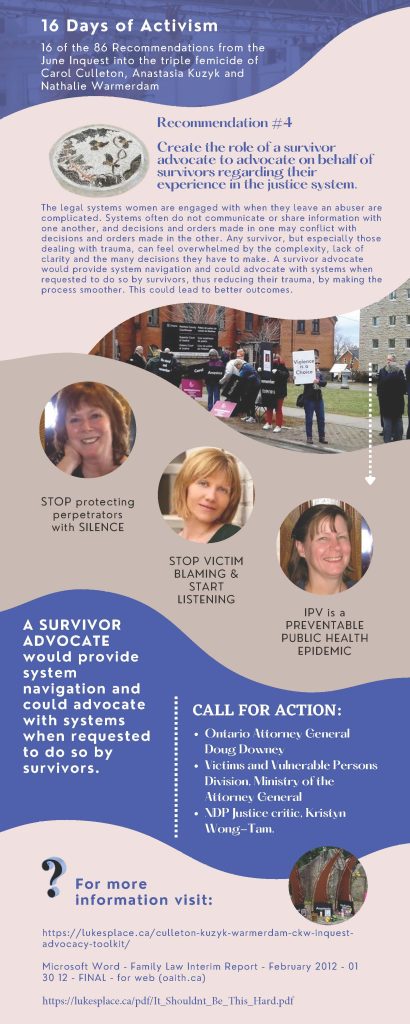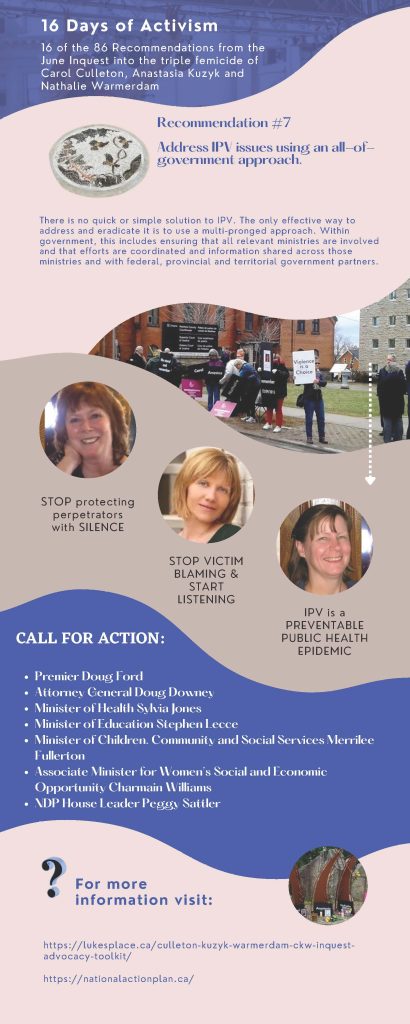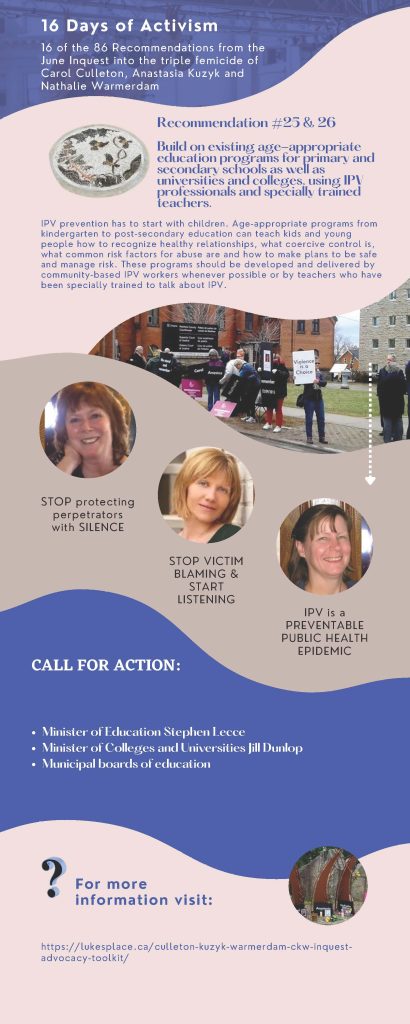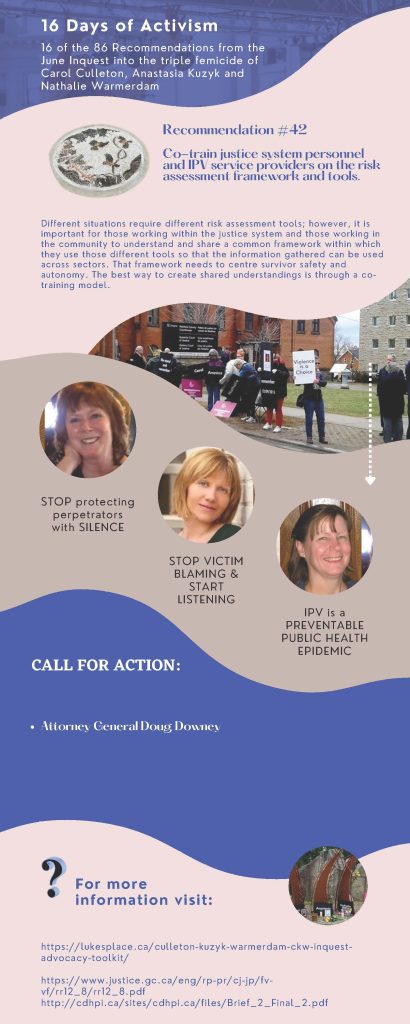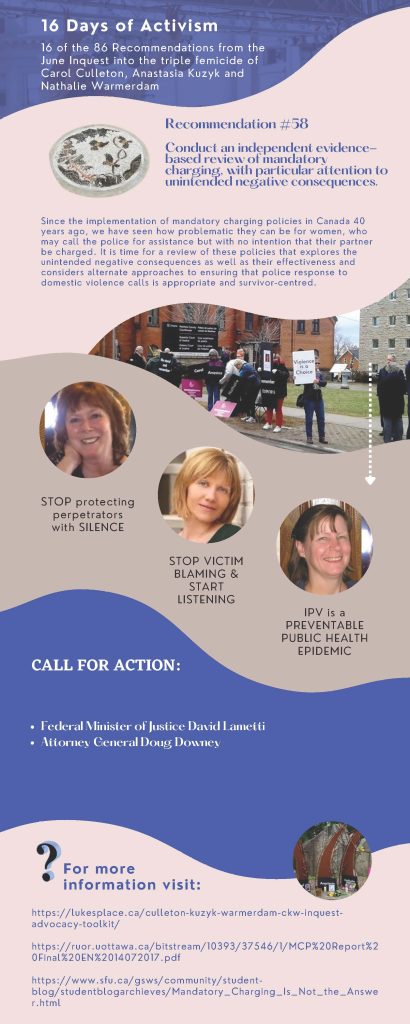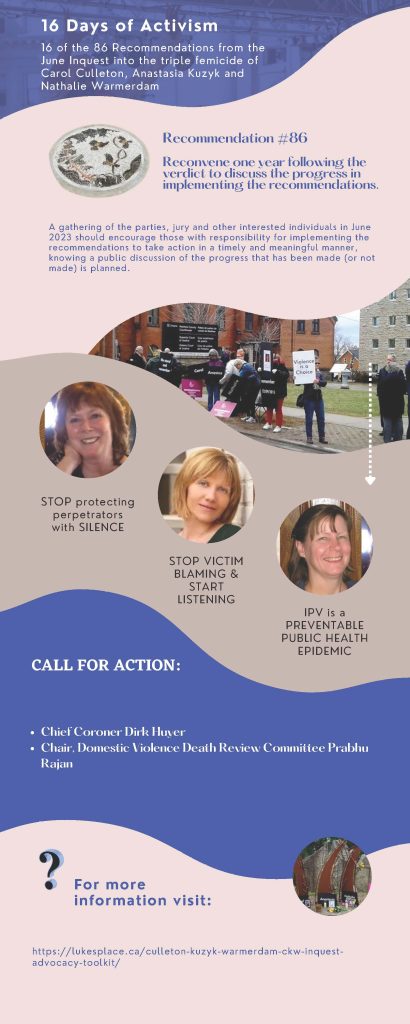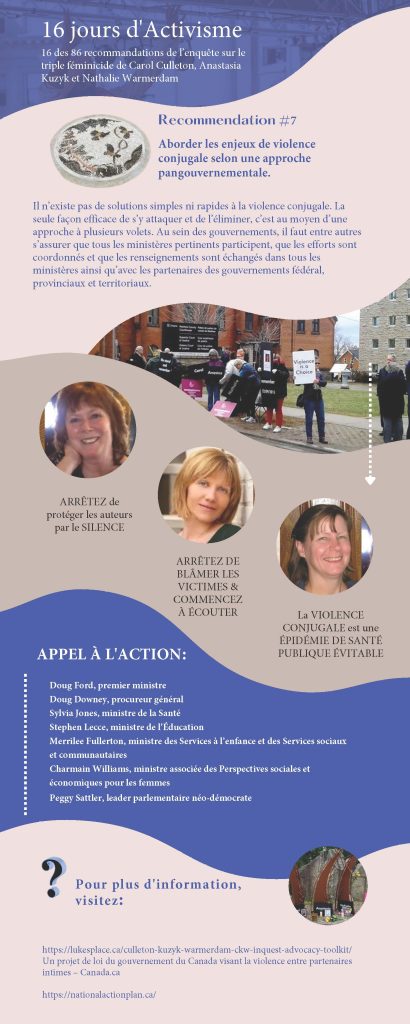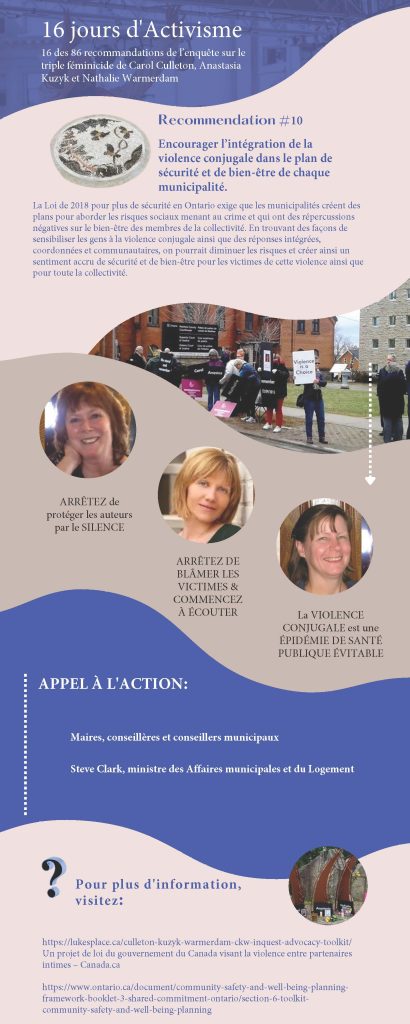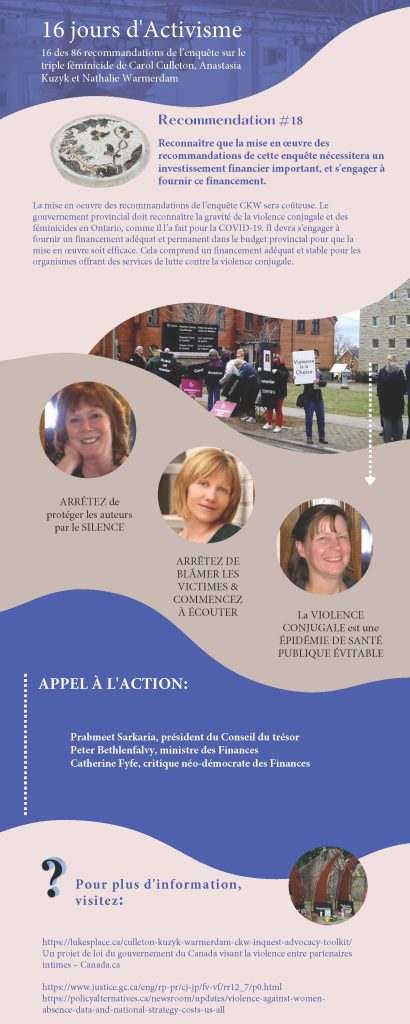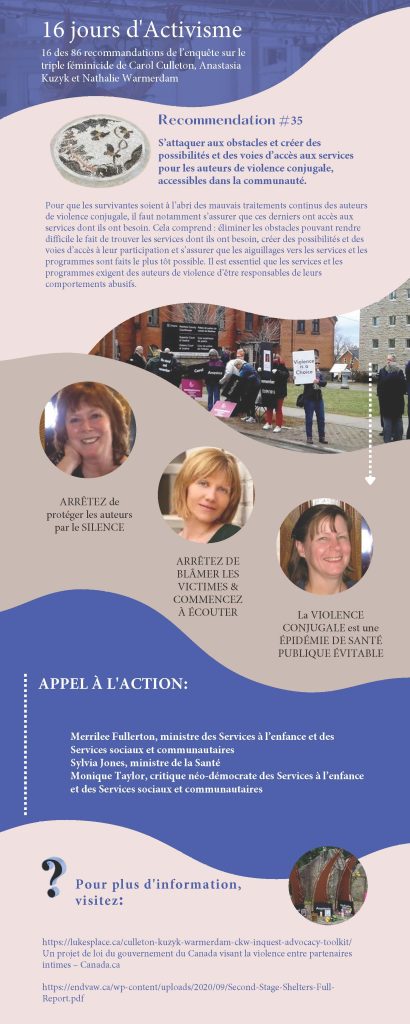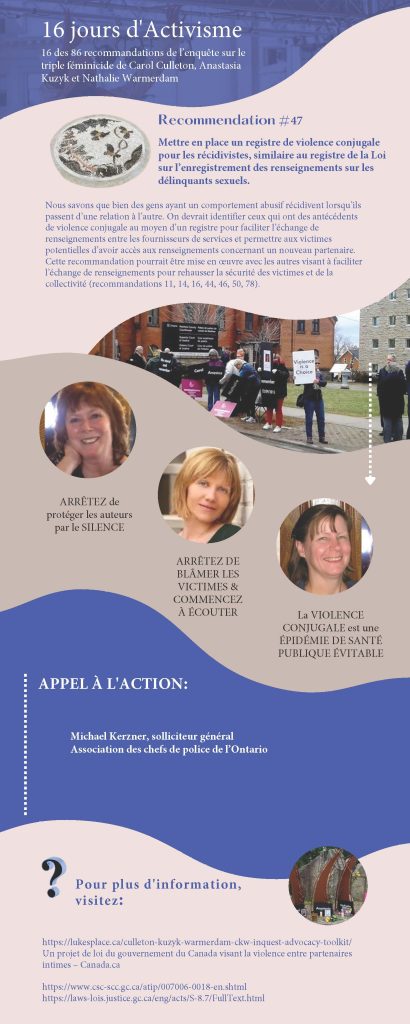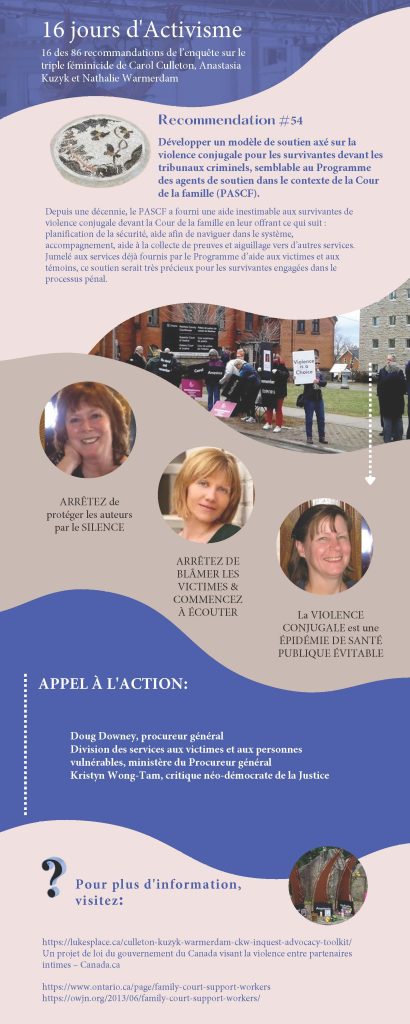Culleton, Kuzyk & Warmerdam (CKW) Inquest advocacy toolkit
Originally published October 25, 2022
Last updated May 30: As of today, 16 municipalities in Ontario have declared intimate partner violence to be an epidemic, in support of the first of the jury’s 86 recommendations. These declarations are largely the result of hard work by VAW organizations in each community — congratulations! For a complete list of the municipalities that have declared IPV an epidemic, please see here. If you are thinking about approaching your municipality to make this declaration, see here for a sample presentation.
Background
On the morning of September 22, 2015, in rural Renfrew County, Carol Culleton, Anastasia Kuzyk and Nathalie Warmerdam were murdered by a man with whom each had had a past relationship. The perpetrator was arrested later that day and has been imprisoned ever since.
In 2019, the coroner’s office announced that the province would hold an inquest into the murders. That inquest – the CKW inquest — took place in June 2022. The five-person jury, after listening to three weeks of testimony and reviewing voluminous written exhibits, returned with a verdict that included 86 recommendations for change.
The recommendations
Of the 86 recommendations, 68 were directed at the provincial government across a range of topics: oversight and accountability; funding; education and training; measures addressing perpetrators of IPV; intervention and safety. Five recommendations related to gun control were directed to the Chief Firearms Officer; three about the Domestic Violence Death Review Committee (DVDRC) and one calling to have femicide added to the categories of causes of death were aimed at the Office of the Chief Coroner, and the Information and Privacy Commissioner of Ontario was directed to support professionals in making informed decisions about privacy, confidentiality, and public safety. The federal government received five recommendations focused on changes to the Criminal Code, the timely implementation of the National Action Plan on Gender-Based Violence and Violence Against Women and the establishment of a royal commission to make the criminal system more victim-centric. Finally, the jury recommended that the inquest parties reconvene in one year’s time to discuss the progress made in implementing the recommendations.
Why advocacy is needed
Inquest jury recommendations are non-binding, which means the government and other entities to which recommendations are directed have no legal obligation to implement them.
To date (October 2022), the provincial government has not responded to the inquest recommendations in any way. While, of course, there may be work going on behind the scenes, the history of femicide inquests in Canada has taught us that governments do not move quickly to provide a meaningful response. Since 2015, the year of the Renfrew County triple homicide, at least 273 women have been killed in acts of femicide.
As the reports of the DVDRC tell us again and again, the vast majority of domestic homicides are both predictable and preventable. Implementation of the 86 recommendations produced by the jury in this most recent inquest would move us well along the right path to significantly reducing the number of women and children killed in this province.
We need to provide the leadership to ensure that these recommendations, which have the potential to save many lives, will be implemented.
What’s in this toolkit
Luke’s Place Support and Resource Centre for Women and Children has developed this toolkit to assist organizations that do not have the time or resources to develop their own advocacy strategy and tools. It reflects the priorities we have identified for ourselves, based on our organization’s mandate, and is certainly not meant to limit or lead the thinking about what recommendations to focus on or what kinds of strategies to use.
We produced these tools quickly, for organizations that need a bit of support to get moving on advocating for whatever recommendations are most important to them, but this toolkit is not a finished product. It will grow over time. Our next goal is to develop discussion papers on some of the law-reform-related recommendations as well as letters to decision-makers related to other important recommendations.
We welcome feedback, constructive criticism, and suggestions if you have any after looking through these materials. We also welcome contributions from anyone doing intersectional feminist advocacy related to implementation of the inquest recommendations, so please send any resources or tools that you have developed along to us, and we can add them to this resource: micahk@lukesplace.ca
Let’s get those recommendations implemented!
Toolkit
Access the toolkit at the links below:
- Introduction
- Frequently Asked Questions for individuals
- Tips for engaging effectively with decision makers
- Social media for inquest advocacy
- Op-Ed tip sheet
- Op-Ed template
- Letter templates
- 16 days of action
- 16 jours d’activisme
- We Remember: A toolkit about inquests and community consultations for feminist organizations in rural communities
- Encouraging your municipality to declare IPV an epidemic
- Community safety and wellbeing plan tip sheet – new! Added January 4, 2023
- Request for Intimate Partner Violence to be Declared a Public Health Crisis (Resource – Nipissing VAW Coordinating Committee) – new! Added February 3, 2023
- The Province Responds – new! Added March 14, 2023
- DVDRC Announcement – new! Added March 28, 2023
- EVA Media Release – new! Added February 17, 2023
- Building a Bigger Wave – Privacy & Information Sharing Infographic & Privacy & Information Sharing FAQ – new! Added March 1, 2023
- Helpful links – new! Updated June 6, 2023
16 days of action image files/16 jours d’activisme dossiers

